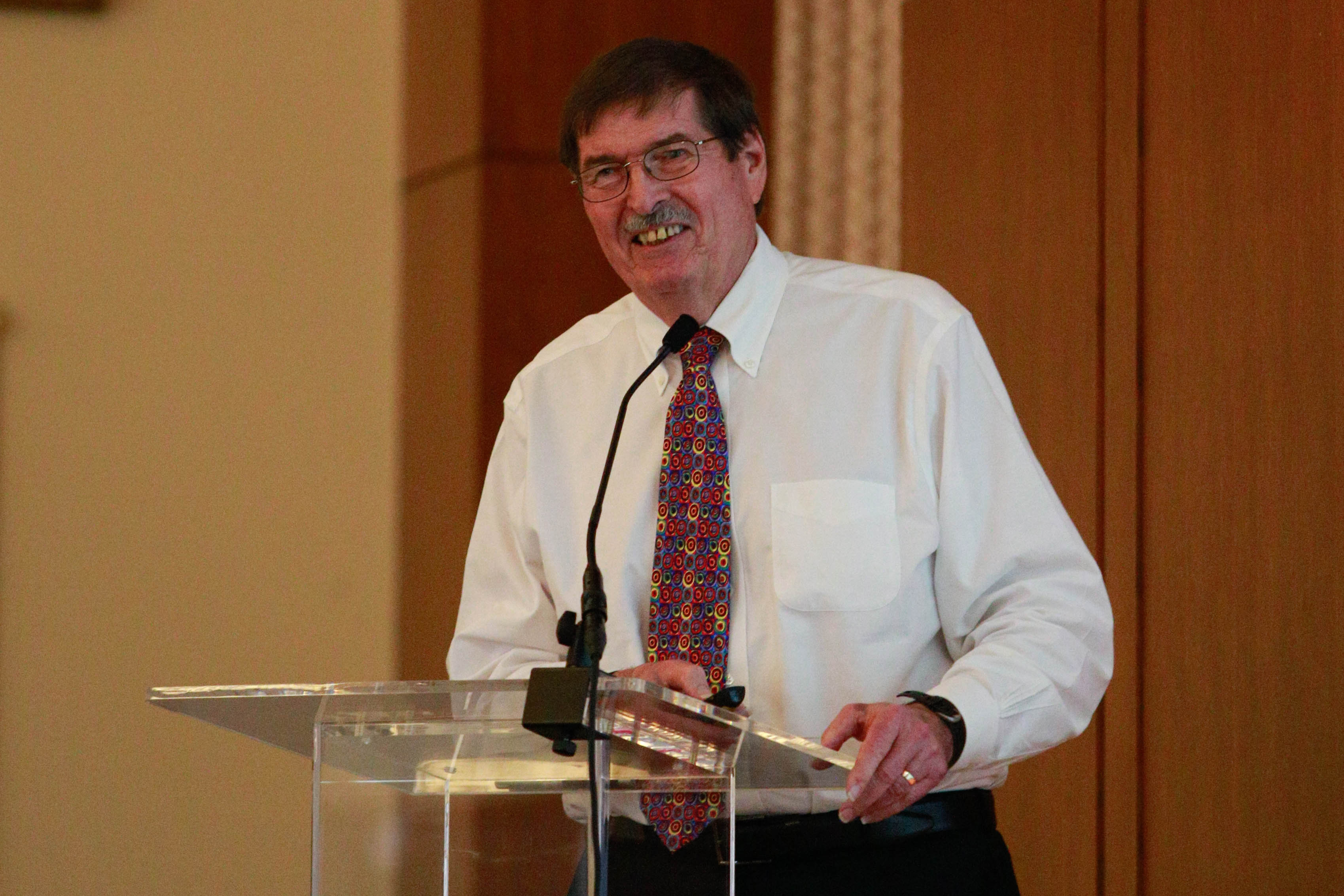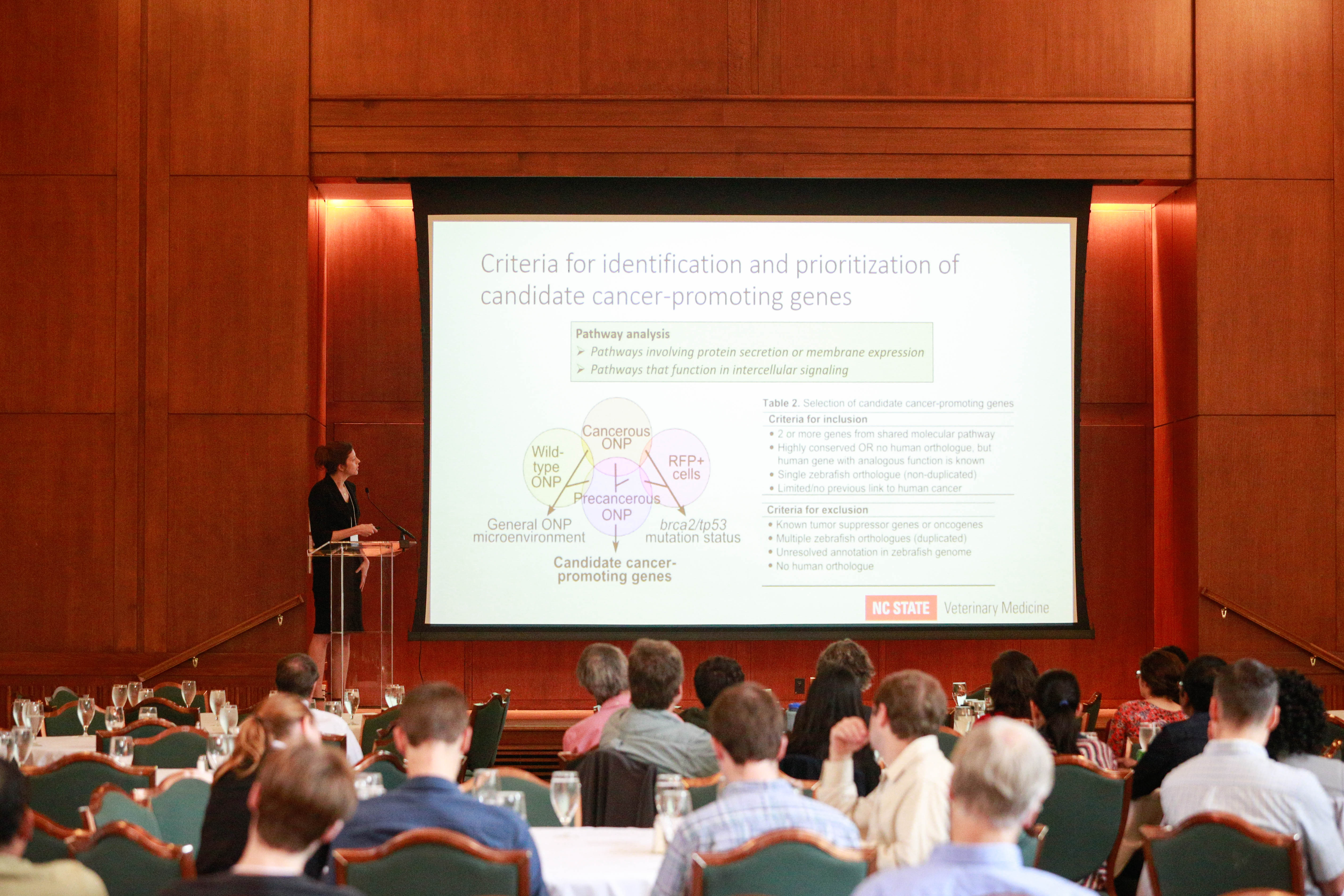
The University of North Carolina Lineberger Comprehensive Cancer Center Director H. Shelton Earp, MD, told faculty, students and staff gathered for the annual scientific retreat that there is a remarkable “breadth and depth” of science going on at the center.
Earp highlighted major cancer research, clinical care and fundraising milestones from the past year as part of his “State of the Cancer Center” update. He also looked ahead to the future, describing plans to create a road map through the development of a new strategic plan for years 2020 through 2025.
“What we want is for our science to have an impact on the care of patients in North Carolina as well as the prevention and early detection of cancer,” Earp said.
The retreat also featured presentations from UNC Lineberger scientists on a range topics and issues. Tim Gershon, MD, PhD, provided new findings into medulloblastoma, the most common pediatric brain tumor. Yuliya Pylayeva-Gupta, PhD, spoke on her research investigating the interaction between the immune system and pancreatic cancer. Deborah Tate, PhD, spoke on how digital health can advance wellness. Rob McGinty, MD, PhD, presented research into a “hot spot” of protein binding on the nucleosomes, which play an important role in chromatin regulation. A presentation from Heather Shive, DVM, PhD, DACVP, of N.C. State University, explored micro-environmental factors impacting cancer development using zebrafish as a model. Jon Serody, MD, spoke on how to use mass cytometry effectively in immunology and oncology studies.

“One of our goals is to build collaborative teams among and between the cancer center members,” said Anne Menkens, PhD, UNC Lineberger’s assistant director for collaborative research. “We have found that having the retreat, and including a broad base of presentations, helps facilitate that. Some years we’ll focus in on a topic, but most years we bring in new voices to speak from all the different angles that our cancer center members research.”
Earp spoke about the past year’s achievements. In terms of funding, UNC Lineberger brought in approximately $60 million in cancer research funding from the National Cancer Institute, he said, which ranked the center 11th in the nation. It also raised $18 million in private philanthropy in fiscal year 2018, a record for the cancer center, and is ahead of its goals in the overall university campaign, he said.
In addition, Earp said support from the state of North Carolina has been “spectacular.” State funds have been allocated toward advancing three main areas: optimizing cancer outcomes in the state, cancer genetics, and in developing new treatments.
“We invested in the ideas that we wanted to become one of the premier cancer centers in the country in those areas,” he said.
Other highlights from the past year include researchers consistently publishing in high-impact journals and many were awarded major grants across disciplines. Some of the notable grants and publications included 26 papers authored by UNC Lineberger’s Katie Hoadley, PhD, assistant professor in the UNC School of Medicine Department of Genetics, in the spring on cancer genetics, and a key study by UNC Lineberger’s Dale Ramsden, PhD, professor in the UNC School of Medicine Department of Biochemistry and Biophysics, that upended the central dogma of biology.
In terms of clinical care delivery, UNC is “second to none,” Earp said. He highlighted the growth in new patient visits from approximately 2,500 when the new N.C. Cancer Hospital building opened, to more than 7,500 new patients per year today.
“I am really proud of the way we take care of patients,” he said.
Earp said that the cancer center, the School of Medicine and the UNC Health Care System had a banner year recruiting and retaining many faculty members. There were key recruitments in the past year in surgical oncology, radiation oncology, pediatric oncology, cancer outcomes research, and in other areas.
UNC Lineberger, he added, has initiated a number of programs that are extending its reach throughout the state, such as through the lay patient navigation program, as well as to support patients through the financial and psychosocial impact of the disease as part of the Comprehensive Cancer Support Program.
Earp applauded the advances of the recently cellular immunotherapy program, which uses a patient’s own immune system to fight cancer. Chimeric antigen T-cell receptor (CAR-T) therapy has advanced into the clinic at the N.C. Cancer Hospital, with trials opening to study innovations in treating blood cancers and multiple myeloma. New trials are planned for neuroblastoma, ovarian cancer, and glioblastoma. Researchers are also working to make these treatments safer.
“To have the ability to get rid of unintended consequences, the toxicity of new therapies, has driven our group to devise safety switches for this new attempt to cure cancer,’” Earp said.
The retreat also included a research poster presentation and competition, with winners chosen in the areas of population science, basic science, and clinical/translational science. The winners for the population science competition were Halei Benefield, first place; Gieira Jones, second place; and Sarah Mills, third place. The winners in basic science were Aleksandra Skrajna and Matthew Lipner in first place, Juan Carvajal-Garcia in second place, and Tigist Tamir in third place. In clinical/translational research, the winners were Sunil Kumar, first place; Katherine Tucker, second place, and Matthew Painschab, third place.
